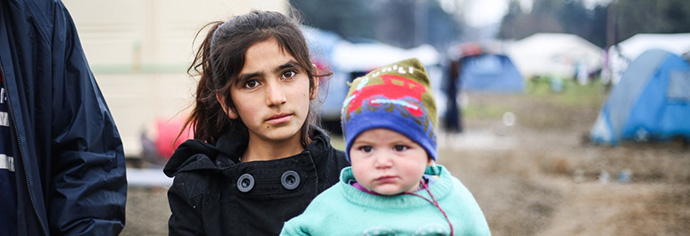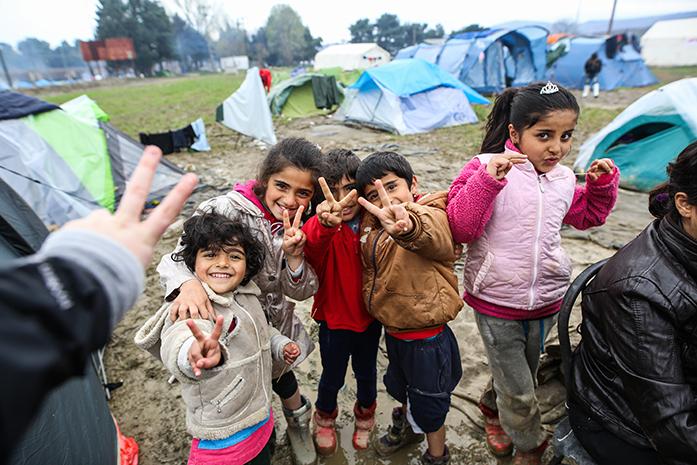I turned my face to the bus window, sobbing silently, hoping the Syrian refugees wouldn’t see me from their seats across the aisle. How was I, a privileged 19-year-old American girl, supposed to answer one, who had just asked me the only words she knew in English: “The borders … open?” I just shook my head and peered outside to the barren landscape, continuing to wipe the tears from my eyes.
In March 2011, conflict broke out in Syria, becoming an all-out civil war by 2012. And soon after, the eyes of the globe were riveted on stories of fleeing refugees heading to seek a safer existence in Europe. They were escaping a fallen infrastructure in the government, economy, and health care, along with the violence and bombings that have killed 470,000 people, according to the Syrian Center for Policy Research.
My own journey came about because as a young journalist, I wanted to be witness to events that to me seemed so cataclysmic in terms of the human condition. I knew it was a big story. And I had an angle: An Iowa law-school graduate whose parents are friends with mine worked in the camps in Greece. I set out to chase down Drew Craig, a 29-year-old field coordinator for the nongovernmental organization Lighthouse Relief in northern Greece, where thousands of Syrians fleeing violence had arrived.
The Cedar Rapids native was hard to track down, his parents, Jim and Debbie Craig, had only spoken with him twice in the few months he had been in Greece. Drew and I had been acquaintances throughout the years, but I never expected the two of us would cross paths so far away, under these conditions.

Drew’s infinitely deep voice contrasts with his smaller stature, and he’s recognizable by his facial hair. Drew stands mostly with his arms across his chest, his body sort of gliding as he walks with purpose.
Before the camps, Drew graduated from the University of Iowa College of Law in 2013. During law school, he worked for the Iowa Office of the Attorney General in 2011 and the State Appellate Defender in 2012. Hoping to effect change abroad, he joined Defense for Children International in Ramallah, a Palestinian city in the West Bank, as a legal intern in 2012.
But he had left his legal life behind him, at least for the moment. Now, halfway across the globe, he seemed more somber than I had remembered him. He seemed deep in thought. No wonder, I guessed. I first saw him in Polykastro, Greece, on March 14, when he picked me up at the bus station. I was jubilant to see a familiar face after being in Lesvos for two days, photographing refugees coming ashore. But Drew? It seemed as if he was entirely preoccupied. I soon learned why.

“You’re just going so much that you don’t really think about details,” Drew told me later. Small details such as eating and sleeping. I was with him for three days and saw him consume three small bakery items. He barely slept; rather, he answered calls, emails, and texts until the late hours of the night. Then he woke up early the next morning to get supplies for the camp he worked with that day. To me, it seemed like an incredible pace.
Northern Greece
Drew picked me up in a massive white van with the words “lighthouserelief.org” printed in black on the side. The van was full of supplies, bags, and a makeshift bed. Drew and a couple other volunteers had slept in the van a couple of nights while trying to find a place to stay near the camps.
The only time Drew had for me to interview him was while he drove, but he wasn’t entirely focused on my questions. After telling me he felt as if he were living in a bubble in America and that he needed to get out, he paused to say, “Oh thank god, they got firewood here … this is awesome. They haven’t had any firewood for so long.” It was freezing outside when we arrived at EKO (pronounced “Echo,” named after the gas station that the refugees camped around) outside of Polykastro. EKO held approximately 2,000 people.
I asked him how he put little things into perspective when he sees so many in need. He gave me a stream-of-consciousness response: “When we’re doing these projects, we’re constantly considering: OK, the people at this gas station need new floors for their tents because their tents are leaking mud through. Well, they may need new tents, but what they really need is to not be in a refugee camp. So do we give them new floors? Or do we focus our efforts elsewhere? By giving them new floors, are we kind of enabling the people who have put them in this situation? Or are we enabling the people who continue to make this a political issue over a humanitarian issue? Maybe.”

I asked him about his faith in humanity. He laughed slightly and said, “Let’s pick that up later.” We got out of the car and headed toward the hospital where Lee, a Canadian journalist who normally lives in Jerusalem, had offered his translator skills to the people in the hospital. The doctors and nurses didn’t speak Arabic or English, so communication was often flawed. Lee spent the entire day telling patients when to take medication, or that their arm was broken, or that they needed to stay in the hospital because their child was still sick.
I asked Drew again about his faith in humanity. “I see the best and worst in people,” he responded. Every morning, Drew went to Park Hotel, a small inn seemingly in the middle of nowhere, to coordinate with other NGOs and volunteers for the day.
“[The volunteers] are sleeping in tents, haven’t showered for days, are spending [their] own money and fundraising for the refugees,” Drew said. “And every day they’re going into camp, doing whatever they can to help.”
And then he pointed to the policymakers “on the other side” — his perspective was they have little empathy with a situation they have not experienced.
Despite the efforts of the volunteers, along with protests in the camps, the borders remained closed.
“It’s very easy to discuss closing borders when you’re sitting in Europe, and all you have to do is order a ship to go stop boats that you’ll never have to see and affect people you’ll never have to talk to, despite the fact that your conduct might have had something to do with why those people are getting on a boat to begin with,” Drew said.

Later in the week, I accompanied Drew and two volunteers to another refugee camp in Cherso, run by the Greek military. Drew wanted to assess the needs of the people in this camp because he thought they seemed to have been underserved by the government.
Before we gained access, I saw a middle-aged man in a red shirt holding the hand of his daughter, who looked to be about 6. They approached a soldier. The man was panicky and tried to explain in broken English that the little girl needed an eye doctor. The soldier spoke to him harshly and shouted, “I’m not a doctor.” I stood about 15 feet away, a shock and awe moment for me as I realized no eye doctor was available to help this little girl. One of her eyes stared straight ahead. The other eyeball seemed to roll around on its own axis. The father stood in disbelief, then quietly took his daughter’s hand and walked away.
We entered the camp. Initially, the guard insisted on accompanying us, but Drew kicked into diplomacy mode, and the guard backpedaled.
Women warmed plastic bottles over an open fire to heat their baby formula. One woman said her baby was throwing up after drinking the milk. We were horrified. Drew scribbled down another need: pots.
I heard coughing, babies crying, but despite the 4,000 refugees in the camp, a disconcerting silence. At this point on the recording device, you can hear me trying to get Drew’s attention. I had noticed a man scrambling up a thin tree to manually saw off the branches at the top for firewood. Drew was unfazed.
Some refugees at Cherso told us they didn’t want our help improving conditions, they wanted to be out of the camp. I asked Drew later how he comes back from days like the one we had just experienced. He didn’t have an exact answer for me.
“I don’t know … people differ. I have friends here who will ask me how to deal with this, and maybe it’s some sort of defense mechanism to sort of numb yourself to what’s going on.”

But I saw Drew stare at the ground when a persistent middle-aged man told him he couldn’t live like this anymore, and I saw Drew stand silently for an hour while we waited for a ride from the only Lighthouse van running … I didn’t see numbness at all.
Sara Montesinos, a Lighthouse volunteer from Barcelona, asked me, “Do you say losing the faith in humanity [in English]?” I nodded. She replied: “I lost it.”
Back at Park Hotel, I had more time to discuss with Drew his plans and how he will continue to help the refugees. The stream of consciousness returned.
“I can probably only stay until next month,” he said. Drew has law-school loans to pay off and is living on funds that are dwindling. “This is a difficult thing [being a humanitarian], and you hear about people who are burnt out and some that I’m sure regret going into this field, but even when it’s difficult to see an impact on a larger scale than just the one person you’re handing baby formula to, as someone who’s interested in the development and coordination of these programs, I’ll do this as long as I can.”
Drew doesn’t exactly know what his future holds, but as he gains experience in crisis situations and his career progresses, he said he may want to move back into the policy realm of things to try to make changes in the systems responsible for responding to crises.
“I wouldn’t be much good as a policymaker if all I knew was the Capitol building,” he said.
I got a chance to speak with Sara again. Sara worked with Lighthouse in Lesvos and then as an independent volunteer in Idomeni. When we talked, she sat down next to me, bundled up in a ton of layers, crossed her legs over the couch, and placed her ashtray down on her dirty rain boot. Sara was small, but so mighty.
I asked her how she got here — to the middle of the refugee crisis in Greece — from working a desk job in Spain. She told me people can either make money at a regular job or go out and meet people and try to make sense of this “f**ked up world.”
A few days ago, she said, she saw a grown man crying because he and his three kids were living in a tent full of water and mud.
“That could be my father,” she told me.
“There are some things you can not explain,” she said. “You can not explain how burnt plastic smells. You can not explain how f**king cold it is. You can not explain this.”



